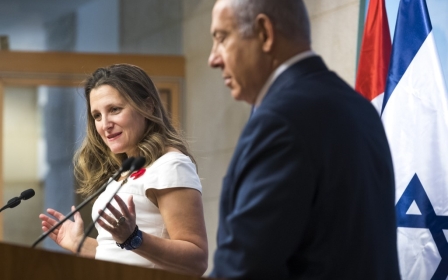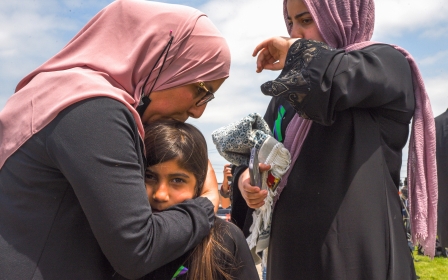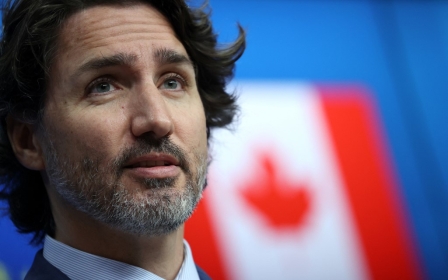Canada: Dropping charges in hijab-pulling case sets a dangerous precedent

The Crown’s recent decision to withdraw charges in a widely reported Canadian hijab-pulling case has reignited concerns about systemic bias in the justice system, leaving Muslim women across the country in a state of disbelief.
In justifying the dismissal of charges, Assistant Crown Attorney Moiz Karimjee argued that the victim’s chant, “From the river to the sea, Palestine will be free,” could reasonably be understood as a “call for genocide of the Jewish people”.
This weak and dubious justification disregards the chant’s well-known context as a Palestinian freedom slogan, effectively excusing a violent act that has been denounced as a hate crime by the Canadian Muslim Public Affairs Council.
The incident occurred in Ottawa in May, when 74-year-old Lorna Bernbaum approached protester Hayfa Abdelkhaleq, held up a middle finger, and pulled down her hijab - a blatant attack on Abdelkhaleq’s dignity and safety.
The Crown’s rationale for withdrawing charges reveals a troubling bias in the Canadian justice system. When the subjective motives of the attacker are prioritised over the victim’s rights, the rule of law is undermined. Canadians should be outraged at the erosion of fundamental rights for political interests.
New MEE newsletter: Jerusalem Dispatch
Sign up to get the latest insights and analysis on Israel-Palestine, alongside Turkey Unpacked and other MEE newsletters
While the Crown acknowledged the slogan has peaceful interpretations, it chose to focus on the most extreme one, even warning that future chanters could face charges if “genocidal intent” was established.
Many Palestinians, Arabs, Muslims, Jews and other advocates saw this extraordinary pronouncement as a threat of reprisal for exercising their Charter rights to criticise Canadian foreign policy and Israel’s actions in Gaza.
Chilling free speech
For many Palestinians and their supporters, the “river to the sea” chant expresses a desire for national self-determination, freedom, equality and dignity, while rejecting oppression, colonialism and sectarianism.
Dov Waxman, a scholar at the University of California, Los Angeles, noted in a CBC interview that Palestinian and Jewish self-determination can coexist, pointing to the chant’s origins as a call for justice. The Crown overlooked this perspective in its decision.
Follow Middle East Eye's live coverage of the Israel-Palestine war
The prosecutor’s move not only chills free expression, but also reveals systemic issues, including the pressure victims face in politically sensitive cases. Indeed, Abdelkhaleq, whose victim-impact statement detailed deep and lasting trauma, told the CBC that she felt pressured to agree to the withdrawal of charges after receiving an apology from Bernbaum and an offer of restitution.
Abdelkhaleq’s account revealed her insecurity and despair after the assault, heightened by the message that this decision sends to others facing backlash and violence for peaceful protests.
If subjective offence can override lawful expressions of dissent, we risk eroding the democratic values that protect open dialogue
The withdrawal of charges comes just months after an investigation by The Breach uncovered a committee within the Ontario Ministry of the Attorney General that allegedly pushed for harsher charges against pro-Palestine activists, while guiding police to target this movement as “hateful”. The committee reportedly intervened to prevent charges in some cases from being dropped.
Such interference threatens prosecutorial impartiality, especially in cases involving politically charged speech.
The University of Toronto encampment decision this summer stands in stark contrast: there, a judge found that, without clear evidence of hateful intent, such chants are legitimate expressions of a community’s struggle, not criminal calls for violence.
Selective enforcement
Allowing subjective interpretations to determine the legality of speech sets a troubling precedent, particularly for marginalised groups. Legal scholars and advocates have sounded the alarm.
The Breach reports that members of the Ontario committee have displayed pro-Israel bias, recommending tougher actions against pro-Palestine activists. This type of selective enforcement could dangerously politicise speech, turning subjective views into legal grounds for silencing specific groups.
The Crown’s statement that chanting the “river to the sea” slogan might carry “peril” for future protesters only amplifies these concerns.
The historical context of the chant, as traced by Canadian academics in a recent primer, reveals it as a slogan of liberation, equality and coexistence. By casting it as potentially genocidal, the Crown risks empowering subjective offence to stifle dissent, undermining any discussion about Palestinian self-determination.
The move underscores an urgent need to protect free expression, even for politically sensitive speech. Criminalising slogans without demonstrable harmful intent threatens democratic discourse at its core, undermining the objectivity that Crown attorneys are meant to uphold.
While the Crown might argue that dropping charges aims to avoid escalation, this decision undermines public confidence in the justice system. It risks signalling that peaceful protesters could face unchecked violence if their message is deemed “controversial” or “offensive” by dominant groups.
This case is a cautionary tale for Canada’s approach to free speech. If subjective offence can override lawful expressions of dissent, we risk eroding the democratic values that protect open dialogue. Democracy demands space for dissent, and it is the justice system’s duty to protect those, like Abdelkhaleq, who exercise their right to advocate for marginalised voices.
The views expressed in this article belong to the author and do not necessarily reflect the editorial policy of Middle East Eye.
Middle East Eye delivers independent and unrivalled coverage and analysis of the Middle East, North Africa and beyond. To learn more about republishing this content and the associated fees, please fill out this form. More about MEE can be found here.





